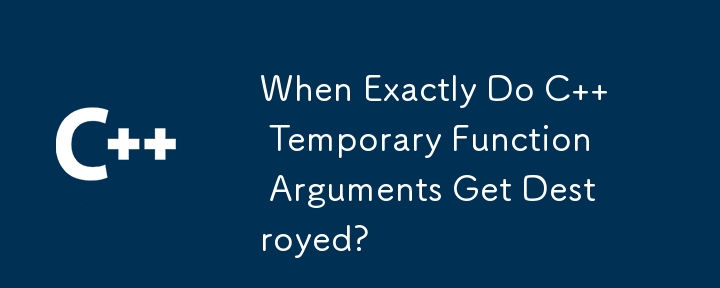

When Do Temporary Function Arguments Die?
In C , when a temporary object is created as an argument to a function, the compiler automatically manages its lifetime. This raises the question: at what point is the temporary object's destructor guaranteed to be called?
According to the C standard, temporary objects are destroyed at the end of the full expression they are part of. Here, a full expression is one that is not a sub-expression of another expression. It typically ends at the semicolon (;) or the closing parenthesis () of control flow statements (e.g., if, while, switch).
In the example provided:
class MyClass
{
MyClass(int a);
};
myFunction(MyClass(42));The temporary MyClass object created as a function argument will be destroyed after the function call statement ends, i.e., when the semicolon is encountered. Therefore, you can assume that the destructor will be called before any subsequent statements are executed.
It's worth noting that the lifetime of temporaries can be extended using const references. By binding a temporary to a const reference, its lifetime is extended to match that of the reference:
MyClass getMyClass();
{
const MyClass& r = getMyClass(); // full expression ends here
...
} // object returned by getMyClass() is destroyed hereThis technique can save unnecessary copy constructions while preserving the value returned by a function, especially when return value optimization is not applicable. However, with the advent of move semantics in C 11, its utility has diminished somewhat.
The above is the detailed content of When Exactly Do C Temporary Function Arguments Get Destroyed?. For more information, please follow other related articles on the PHP Chinese website!
 Will the Bitcoin inscription disappear?
Will the Bitcoin inscription disappear?
 Where is the prtscrn button?
Where is the prtscrn button?
 Can BAGS coins be held for a long time?
Can BAGS coins be held for a long time?
 The difference between UCOS and linux
The difference between UCOS and linux
 What is mobile phone HD?
What is mobile phone HD?
 mongodb startup command
mongodb startup command
 How to connect broadband to server
How to connect broadband to server
 What are the cloud servers?
What are the cloud servers?
 Why can't my mobile phone make calls but not surf the Internet?
Why can't my mobile phone make calls but not surf the Internet?




